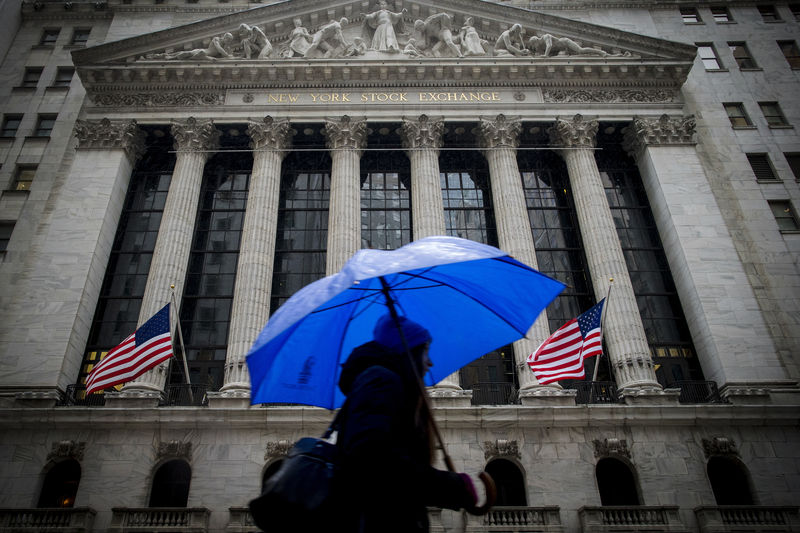Investing.com — U.S. stock futures are mixed on Thursday following a relatively muted session on Wall Street, with traders looking ahead to comments from Federal Reserve Chair Jerome Powell later in the day. In corporate earnings, SoftBank (TYO:) slips to a quarterly loss as the Japanese tech investment giant is impacted by the bankruptcy of WeWork, while Walt Disney (NYSE:) reports better-than-expected earnings thanks to strength at its streaming business and some of its theme parks. Elsewhere, Hollywood actors reach a tentative deal with major studios to end their 118-day strike.
1. Futures mixed after muted day on Wall Street
U.S. stock futures were mixed on Thursday, but did not stray too far from the flatline, after a muted day for the major indices on Wall Street.
By 04:52 ET (09:52 GMT), the contract had added 20 points or 0.1%, were mostly flat, and dipped by 19 points or 0.1%.
On Wednesday, the eked out a gain of 0.1%, although it marked the eighth consecutive positive session for the benchmark index — its longest winning streak since 2021. The tech-heavy also gained 0.1%, while the 30-stock slipped by 0.1%.
Longer-dated U.S. Treasury yields declined following a better-than-anticipated 10-year note auction, in a sign that investors continue to believe that the Federal Reserve is likely done with its long-standing hiking cycle. The yield on 10-year note, which moves inversely to prices, has now dipped by over 40 points since the U.S. central bank left interest rates unchanged at its latest meeting on Nov. 1.
Traders will be eyeing remarks from Federal Reserve Chair Jerome Powell at a conference in Washington D.C. later today. Powell spoke at a separate event in the U.S. capital on Wednesday, but did not comment on monetary policy.
2. SoftBank slumps to loss; Disney earnings top estimates
SoftBank Group dropped to its fourth-straight quarterly loss, adding to the pain for investors and Chief Executive Masayoshi Son following the bankruptcy of once high-flying flexible office space provider WeWork.
The Japanese tech investor’s net loss attributable to shareholders came in at ¥931 billion ($1 = ¥151.0200) in the three months ended on Sept. 30, down sharply from a profit of over ¥3 trillion in the corresponding period last year that stemmed from a sale of a large chunk of its holdings in Chinese e-commerce giant Alibaba (NYSE:).
Costs related to the failure of WeWork — one of SoftBank’s largest bets — and a weaker yen both weighed on the company during the quarter, tempering a boost from the initial public offering of its chip designer Arm.
Elsewhere, Walt Disney posted adjusted earnings per share of $0.82 in its fiscal fourth quarter, topping Bloomberg consensus forecasts of $0.69, thanks in large part to subscriber growth at its streaming services as well as higher attendance at its theme parks in Shanghai, Hong Kong and California.
The entertainment giant also said it is on pace to deliver $7.5B in annualized savings, pointing to the impact of Chief Executive Bob Iger’s ongoing push to rein in expenses. Shares in Disney rose in premarket U.S. trading on Thursday.
3. Deflation returns in China
China re-entered deflationary territory in October, data showed on Thursday, as the country grapples with weak retail spending and a worsening slump in the manufacturing sector.
(CPI) inflation contracted at an annualized 0.2% in October, according to figures from the National Bureau of Statistics, in line with expectations. , a gauge of the cost of goods when they leave factories, shrank 2.6% during the month.
There were scant signs of improvement in overall demand last month, despite stimulus measures from Beijing designed to reinvigorate the post-pandemic recovery of the world’s second-largest economy.
4. Hollywood actors reach tentative deal to end strike
The union representing Hollywood actors has forged a tentative agreement with major studios that will bring an end to the second of two strikes that have roiled the entertainment industry for months.
In a statement, the SAG-AFTRA union said its negotiating committee had unanimously supported a deal with companies like Netflix (NASDAQ:) and Disney. Actors had been striking for 118 days while the fraught talks were ongoing.
SAG-AFTRA said the three-year contract, which is valued at over $1B, will include a bump up in minimum salaries and new royalties from streaming services. It will also grant protections against the unauthorized use of actors’ likenesses by artificial intelligence — a crucial issue raised by performers worried that they could be replaced by digitally-created doubles.
The Alliance of Motion Picture and Television Producers — the studios’ representative — said the agreement represented a “new paradigm” for the industry, adding that it gives actors “the biggest contract-on-contract gains in the history of the union.”
5. Crude ticks higher despite lingering demand worries
Oil prices edged up on Thursday, attempting to recover from their lowest levels in more than three months despite persistent worries over waning demand in the U.S. and China.
The data showing that China, the world’s biggest oil importer, fell back into deflationary territory in October came after the American Petroleum Institute, an industry body, stated that oil stocks rose by almost 12 million barrels last week. If confirmed by official data, that would be the biggest build since February.
By 04:57 ET, the U.S. crude futures traded 0.9% higher at $75.98 a barrel, while the contract climbed 0.9% to $80.25 per barrel. Both benchmarks hit their lowest marks since mid-July on Wednesday.
Read the full article here








